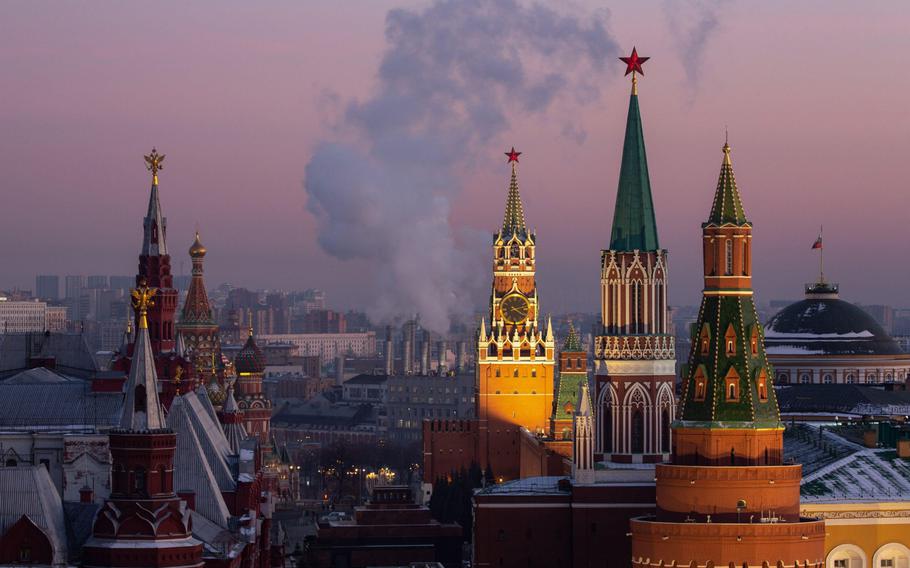
The Kremlin in Moscow on Dec. 11, 2020. (Andrey Rudakov/Bloomberg)
The threat of Russian military invasion of the remainder of Ukraine represents the most serious military crisis and challenge in Europe since the Balkan wars of the 1990s. The current substantial buildup of Russian military forces around that nation continues, ominously.
President Vladimir Putin of Russia continues to exploit the situation to increase his international visibility and attempt to reinforce his deserved reputation at home as a strong, effective leader. Restoring order and stability following true anarchy in Russia following the collapse of the Soviet Union has been key to his remarkably durable tenure in office, which now surpasses two decades.
In the current situation, the United States has put 8,500 troops on “high alert” for possible participation in an Allied military action over Ukraine. This is somewhat reminiscent of the confrontations with the Soviet Union regarding Berlin during the Cold War, but so far is not on the level of nuclear confrontation between the U.S. and Soviet Union over Cuba in 1962 or the Yom Kippur war in the Mideast in 1973.
The Ukraine crisis also is a long-term affair. In 2014, Russia seized Crimea and the eastern portion of Ukraine. Crimea had been part of Russia until Soviet leader Nikita Khrushchev transferred the peninsula to the authority of Ukraine in 1954.
Ukraine, historically part of Russia, became independent following the Russian Revolution that began in 1917. After World War II, the Soviet Union absorbed the nation. Independence returned following the collapse of the Soviet Union in 1991.
The overt invasion of eastern Ukraine by Russia’s army, after months of covert aid to rebel forces, drastically undercut the cautious stability of Europe that followed the Cold War. The U.S. and European nations have an obligation to respond skillfully, while trying to avoid direct combat with Russian forces if possible.
The fall of the Berlin Wall in 1989, followed by the disintegration of the Soviet bloc of satellite states, and then the Soviet Union, represented historic strategic victory for the West. The end of the Cold War confirmed the policy of restraint and deterrence termed “containment,” supported by every United States president from Harry Truman when the Cold War began in Europe, to George H.W. Bush, who navigated the end of the long-term and extremely dangerous ideological, military and political conflict with exceptional diplomatic skill.
Truman and associates spearheaded the formation of NATO (North Atlantic Treaty Organization) in 1949 to counter Soviet expansion toward Western Europe. The Soviet Red Army conquered and occupied Eastern Europe in consequence of the titanic struggle and victory over Nazi Germany in World War II.
Moscow responded to NATO by establishing the Warsaw Pact, which disintegrated following the end of the Cold War. NATO endures.
Putin, undeniably a remarkable leader, generally plays his strategic cards well. However, his hand remains weak. The Russian economy is structurally vulnerable, heavily dependent on petroleum and plagued with corruption.
Opinion polls in Russia show Putin’s popularity declining. External power plays clearly are in part a response. The very existence of serious opinion polls provides profound evidence of just how much Russia has changed since the era of Soviet totalitarianism.
General war in Europe was avoided for a century following the final defeat of Napoleon and the outbreak of World War I. A concert of European nations, brokered by Great Britain, was essential to the effort. The British government played a crucial brokering role in the creation of NATO.
Poland, a NATO member since 1999, is active in the collective effort to provide arms to Ukraine. The new coalition government in Germany led by Chancellor Olaf Scholz has been low-profile, so far a striking contrast to his predecessor Angela Merkel.
President Joe Biden remains unsteady, and the chaotic Afghanistan departure a stunning failure, but the U.S. is strong. Russia is relatively isolated in Europe, and objectively weak.
Arthur I. Cyr is author of “After the Cold War — American Foreign Policy, Europe and Asia.”